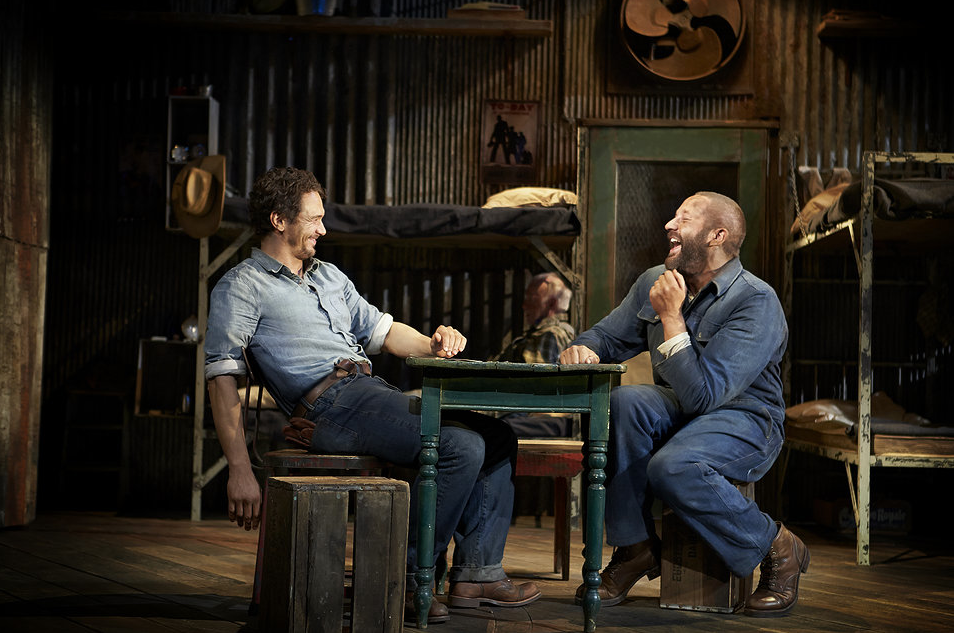
Anyone who doubts that star power is driving Broadway these days need only check the current box-office figures. A Raisin in the Sun, a revival of Lorraine Hansberry’s 1959 classic, is a sellout — thanks largely to its movie-star leading man, Denzel Washington. Of Mice and Men, John Steinbeck’s Depression-era warhorse, is another hot seller, helped by a starry cast headed by James Franco and Leighton Meester, formerly of the hit primetime soap Gossip Girl. Stars have also given a big box-office boost to two more upcoming revivals: Daniel Radcliffe in Martin McDonagh’s The Cripple of Inishmaan, and Neil Patrick Harris, as a German transsexual in the rock musical Hedwig and the Angry Inch.
But the stars aren’t drawn only to retreads. Will Eno’s new play The Realistic Joneses, an enigmatic, plot-free encounter between two suburban couples, both named Jones, would most likely never have come to Broadway (and certainly would have been more of a trial to sit through) if it weren’t for its expert quartet of well-known stars — Marisa Tomei, Toni Collette, Michael C. Hall and last year’s Tony-winner, Tracy Letts. By the same token, a little more star power might have helped Bullets Over Broadway, Susan Stroman’s enjoyable but less-than-dazzling new musical based on Woody Allen’s movie. Nearly every cast member (Zach Braff as the nebbishy playwright who gets a gangster to back his Broadway show, Helene Yorke as the mobster’s no-talent girlfriend, Marin Mazzie as the show’s diva star) seems a step down from the more distinctive actors (John Cusack, Jennifer Tilly, Dianne Wiest) who brought the characters to life on screen.
It’s easy to be cynical about Broadway’s fixation on stars, but their presence has been been mostly good news this spring. I was not looking forward to another go-round with A Raisin in the Sun — last revived on Broadway just 10 years ago, with Sean Combs, and also revisited in the 2011 Pulitzer Prize-winning play Clybourne Park. Moreover, the casting of Denzel Washington, as Walter Lee Younger, the chauffeur whose dreams are dying in the crowded Chicago apartment he shares with his family, seemed so obvious that I had to check the theater websites to make sure he hadn’t done it already.
He should have done it already. Washington, at age 59, is now a couple of decades too old for the part. The script has been adjusted to boost the character’s age from 35 to 40 (and the fit actor can plausibly pass for it), but the already broad age gap between Walter and his college-age younger sister (played by a young-looking Anika Noni Rose) is now almost untenable; she looks like his daughter.
Yet Washington quickly dispels the reservations. His commanding voice and magnetic physicality envelop the stage: he seems ready to burst out of the Youngers’ already cramped apartment. And yet he doesn’t overwhelm this admirably even-handed play: director Kenny Leon gives all the well-chosen actors— especially LaTanya Richardson Jackson, as the intrepid family matriarch, and Rose, as her acerbic daughter —their chance to shine. But it’s the play that shines most: the definitive depiction of the black experience in mid-century America, as relevant and powerful as ever. The chance to see the leading African-American actor of his generation finally take it on, even a few years late, seems both fitting and essential.
Of Mice and Men, the play that Steinbeck adapted from his 1937 novella about a pair of itinerant farm laborers in California’s Salinas Valley, is not as often revived (it was last seen on Broadway in 1974, with James Earl Jones in the role of Lennie). But it seems even more a part of our collective consciousness: its story of a tragic friendship as resonant as a Biblical fable, its snapshot of Depression-era migrant workers part of the American grain. As with Raisin in the Sun, revisiting it seemed more like a duty than a chance for fresh insights.
But one insight is that James Franco, in his Broadway debut, can hold his own on stage. The polymathic actor/writer/director/Instagram celebrity has played everything from James Dean to Spider-Man villains, but his scruffy cool and restless intelligence often seems like a throwback to the 1930s; one could imagine him replacing John Garfield in Group Theater productions of Clifford Odets. As George, the companion and caretaker for the kindly, feeble-minded Lennie (played with touching, if rather familiar, gentle-giant oafishness by Chris O’Dowd), he steps easily into Steinbeck’s world: a cynical victim of an economic system stacked against him, clinging to a doomed friendship out of pragmatism, loyalty and something like love.
Anna D. Shapiro’s crisp, unfussy production reminds us what an expert piece of stagecraft Steinbeck created. Each minor character is sketched in a few brief, vivid strokes; the Depression-era sense of social injustice is muted but unmistakable; the march toward tragedy perfectly paced and inexorable. A few paragraphs ago I called the play a warhorse. But cheers for this production, and the Hollywood star who helped make it happen, for letting a new audience rediscover it as a moving masterpiece.
More Must-Reads from TIME
- Why Trump’s Message Worked on Latino Men
- What Trump’s Win Could Mean for Housing
- The 100 Must-Read Books of 2024
- Sleep Doctors Share the 1 Tip That’s Changed Their Lives
- Column: Let’s Bring Back Romance
- What It’s Like to Have Long COVID As a Kid
- FX’s Say Nothing Is the Must-Watch Political Thriller of 2024
- Merle Bombardieri Is Helping People Make the Baby Decision
Contact us at letters@time.com